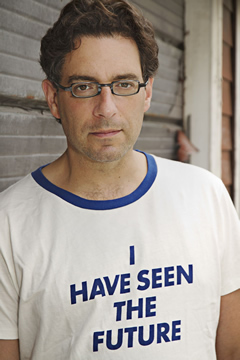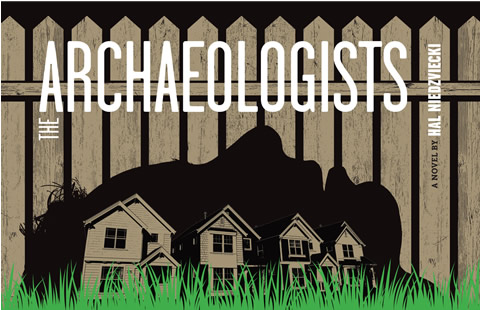In an age of instant gratification when we can download music and books with the click of a mouse and binge-watch TV series on Netflix, writer Hal Niedzviecki (BA 1994 UC) focuses, instead, on the slow reveal. With his new novel, The Archaeologists, Niedzviecki takes traditional serialization online. It’s become a growing trend in the publishing industry as more people use their mobile devices for reading; shorter, digestible portions of reading material work better on smaller screens.
From April to October 2016, chapters are released once a week on the websites of five Canadian literary journals in rotation: Broken Pencil (which Niedzviecki founded and currently publishes), Geist, Taddle Creek, SubTerrain and The New Quarterly. The Archaeologists will also be published by ARP Books in fall 2016.

“Something interesting happens when we have to wait,” says Niedzviecki. “The story ends up churning away in our subconscious, and, as a result, we experience the story and characters more deeply. The Archaeologists is a slow-burn kind of story that ratchets up the tension as it goes along. Waiting adds to that tension and excitement.”
Set in the fictional city of Wississauga, Ontario, The Archaeologistss strings together the stories of six main characters and their roles in the discovery of bones in a suburban backyard. Chapters shift perspective from character to character and centre on how each tries to take advantage of this unearthing.
Niedzviecki has already started to receive feedback from his readers on character and plot development as they progress through the novel. He welcomes the opportunity to interact with the audience before they’ve finished the book. “It’s really a different, less reverential way to approach authorship,” he says. “In some ways, literature has become too precious and too solitary. That the story of the people in the book intersects with the everyday lives of those following along is really exciting.”
At U of T, Niedzviecki was an editor at the Varsity and University College’s Gargoyle newspapers. His experiences writing, editing and assigning articles helped him develop an interest in innovative storytelling. “As a writer, you’re accountable to a community, but you also need to challenge that community to read and think in new ways,” he says.
Modern readers may be inundated with click-bait and social media, but Niedzviecki believes that online serialization keeps readers engaged by bridging the gap between the conventional and the contemporary. “Ignoring or competing with those forces isn’t possible,” he says. “We have to experiment with creating parallel equivalencies that have the addictive feel of online content, but lead to something real – to a real book that will be printed with real ink and paper and have a value assigned to it by a real small publisher trying to stay afloat.”
ARP Books supported Niedzviecki’s decision to serialize the novel digitally before the print publication date – a choice that also helps independent publishers create buzz about the book and build an immediate readership.
“This is an opportunity to reach more people and get them to sample the product,” says Niedzviecki. “It’s kind of like giving away samples at the grocery store. A lot of people will just gobble up the snacks and move on, but the people who stop to taste, chat and experience something new will hopefully more than make up for those who just walk away with the giveaway.”
Recent Posts
People Worry That AI Will Replace Workers. But It Could Make Some More Productive
These scholars say artificial intelligence could help reduce income inequality
A Sentinel for Global Health
AI is promising a better – and faster – way to monitor the world for emerging medical threats
The Age of Deception
AI is generating a disinformation arms race. The window to stop it may be closing




